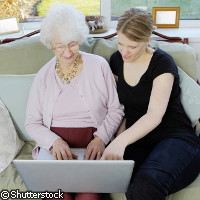EU project gives non-tech-savvy people a boost
Advances in information and communication technologies have done people a world of good but not everyone has access to these innovations. The EU-funded I2HOME ('Intuitive interaction for everyone with home appliances based on industry standards') project, which received EUR 2.7 million under the 'Information society technologies' (IST) of the EU's Sixth Framework Programme (FP6), set out to solve this problem by designing and implementing such technologies in a 'Design for All' approach. Failure to provide innovative tools, such as mobile phones and remote controls, to people who are not technologically savvy impedes their participation in society, obliges them to depend on others and limits their potential. Coordinated by the German Research Center for Artificial Intelligence (DFKI) GmbH, the I2HOME project partners said an approach based on existing and developing industry standards was used to tackle this issue. The eight-strong consortium targeted the use of home appliances by the elderly as well as people with cognitive disabilities. The team also focused on making standardised and developed access strategies applicable to areas outside the home. The I2HOME partners used middleware, which is computer software that links software components or applications. Middleware provides interoperability that effectively supports and simplifies complex applications. For the purposes of this project, middleware is used to enable various gadgets and appliances, including air conditioning and heating, to be controlled by the interface a user has selected. 'The users of the technology have been the driving force in the project - all technical solutions are based on a thorough investigation of the users' needs and desires,' explained Dr Jan Alexandersson from DFKI's Department of Intelligent User Interfaces, who is also leading the I2HOME project. According to the project partners, they cooperated with a number of groups so as to match the technology with their needs. Cognitive-impaired youth, people suffering from Alzheimer's disease and visually impaired persons were among those tested. The I2HOME team is currently assessing the results of the project, and they have already demonstrated how people can use the technology in a mock-up kitchen. 'Finally, something that works,' the BBC quoted Ginger Classen, a blind accessibility expert from Germany, as saying. 'If this technology is adopted by many manufacturers, I could finally go appliance shopping like sighted people in a normal store, having the choice to buy cool and stylish products.' The I2HOME partners noted that in order for the platform to work effectively, all the home-based appliances need to be part of one network. The team has already tested, among others, mobile phones that operate on Windows Mobile and Android platforms, and touch screens. 'I2HOME demonstrates that technology - that has traditionally been regarded as too complex for many mainstream users - can be made usable and enjoyable for older and disabled people,' the researchers explained. Dr Alexandersson said: 'By the start of 2010, there were already more than 100 organisations and companies in Europe using or working with I2HOME technology.' I2HOME brings together researchers and industrialists from the Czech Republic, Spain, Germany, Portugal and Sweden.



